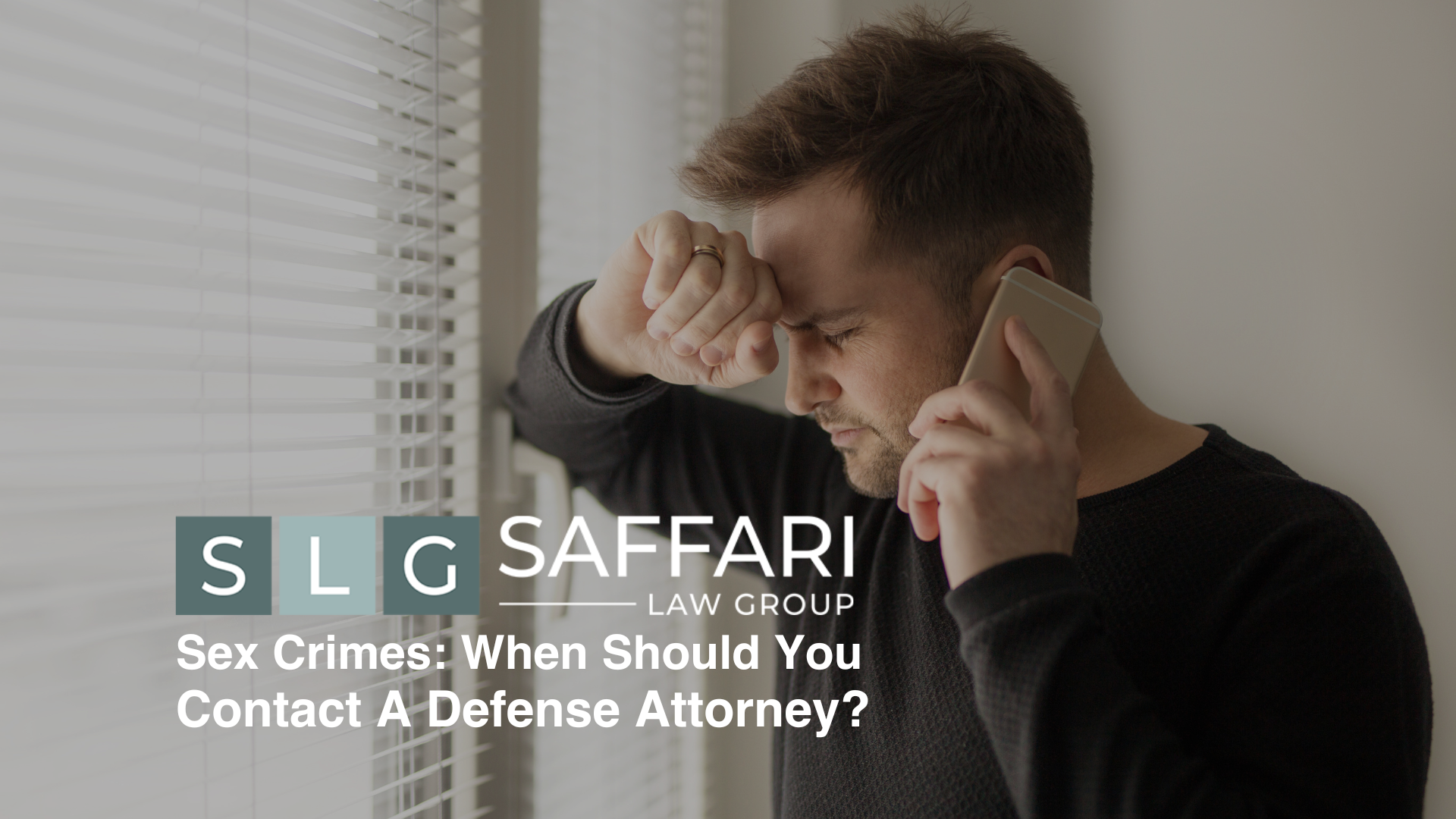
Table of Contents
The adage says, “innocent until proven guilty,” just being accused of a sex crime can cause a severe detriment to one’s personal life and reputation. Despite some laws that dissuade someone from levying a false accusation, especially in the context of a sex crime, false accusations do happen. For this reason, it is prudent to get an attorney involved as early on in the process as possible, even if the case against you appears false or flimsy.
When Should You Get An Attorney Involved?
No matter how strong a defense you may believe you have, getting an attorney involved, even before charges are officially levied, is your best chance of getting ahead of the situation and positioning yourself in the best possible way to win your case and protect your reputation.
In most circumstances, sex crimes are filed and charged after the alleged incident because of this degree of separation between the prosecutor and the alleged crime and the complex nature of the crime. Also, there is often a preliminary investigative part of the process.
Short Window to Act Upon The Charges
In other words, there is a window in which prosecutors will consider all the details to decide exactly what type of charge they deem most appropriate. It’s a common misconception– perpetrated through media and popular crime shows– that the accuser levies the charge; at the same time, the alleged victim has considerable sway.
The decision of what charges to bring always rests on the prosecutor pertinent to the case. Getting a sex crimes defense attorney to act on your behalf in this window is your best chance at protecting yourself.
Unlawful Searchers and Lesser Charges
For instance, your attorney could protect you from having your computer or other belongings searched, and they could shield you from having to answer questions or interact with law enforcement.
In addition, an attorney could ultimately persuade the prosecution that a lesser charge is more suitable to the circumstances if that is any charge.
Note: Having an attorney act on your behalf in this capacity, performing an investigation of their own, is called a pre-file investigation.
Taking Your Attorney’s Advice
Hiring an attorney immediately will also help you better understand how to conduct yourself during your legal process, especially when it comes to talking about it amongst your friends, posting on social media, and whether or not to reach out to the alleged victim.
These types of specific instances will be elaborated on further. To that end, this article will go over the commonly asked questions many attorneys specializing in sex crimes receive from their clients.
What is a Sex Crime in California?

Under California law, a ‘sex crime’ is defined as any forceful or illegal sexual conduct against a person(s). California keeps its definition intentionally broad to cover areas such as rape & date rape, sexual battery lawyer, child pornography lawyer, molestation, sexual abuse, prostitution lawyer, etc.
What is Rape?
Rape is the act of non-consensual intercourse– is probably the first thing that comes to mind when one hears the term ‘sex crime,’ and with that carries some of the harshest penalties upon conviction under California law. Although California law stipulates that to meet the requirements of consent, each party must act freely and voluntarily and know the nature of the act.
Should any one or more of these requirements be impeded, the sexual act constitutes rape. However, this is not to be confused with sexual assault, which in some states is used interchangeably with the term rape.
Related Article: Getting Charged with Rape
Difference Types of Sex Crimes
In California, the distinctions between the two terms are notable. Rape is precisely characterized as forcible penetration, while sexual assault encompasses a broader definition, including acts like groping or fondling of one’s genitalia or private areas without the person’s consent. It’s essential to understand these nuances, especially when seeking legal guidance from a forcible penetration lawyer in Los Angeles.
Sexual battery, a third and often mistakenly interchanged term, involves the non-consensual touching of one’s intimate parts while that person is restrained in some manner.
Date Rape Crime
Date rape is a subcategory only as far as conversational shorthand; ultimately, ‘date rape’ – as it were– is tried and convicted in the same way as a standard rape charge. If you discover that you are under investigation for ‘date rape,’ understand that the phrase is not a legal term to differentiate it from a standard rape charge.
A date rape charge is not meant to imply a “lesser” type of rape. You still face the possible trial and conviction of one of the most severe crimes under California law.
Example of a Date Rape Crime
For instance, in a circumstance of ‘date rape,’ the prerequisites for sexual consent are still impeded: the victim has had their mental capacity diminished and therefore cannot possibly fully understand the situation that they are in; they cannot act freely, and they cannot act voluntarily. Again, the term ‘date rape’ is a conversational shorthand, not a differentiating legal term.
Spousal Rape Crime
Until only a few years ago, a different kind of sex crime, spousal rape, was, in fact, a different legal term. Under California law, rape using ‘diminished capacity’ didn’t exist under spousal rape.
In other words, the law used to be written in such a way that a spouse could intentionally get their partner drunk, for instance, as a means of getting sex. Not only that, the sentences for spousal rape were also less than that of a standard rape sentence by some noticeable margin.
This all changed under California law within the last few years. Advocates stated that the change in law represented a more modern and progressive understanding of marriage and partnership. To that end, if you have been accused of rape by your spouse, it is as serious as an accusation from a stranger, and it could bear the same legal repercussions.
Spousal Rape Defense Attorney
This is why it’s crucial to get a lawyer involved on your behalf to get ahead of the situation and possibly figure out why your spouse might levy this type of accusation against you. That type of information is what wins and loses cases.
Lewd Acts Sex Crime
While not always considered a ‘sex crime’ per se– as we often think of circumstances of rape or molestation, for instance– lewd conduct, according to California law, does fall under that umbrella category.
A lewd act is defined as touching yourself or another person’s genitals, private area, or breasts for sexual gratification while in the presence of others. By itself, a sexual act– even when done in a public place– is not always necessarily a crime; California law stipulates that the alleged offender must know, or reasonably ought to know, that others are present.
Therefore, a common type of defense is genuine unawareness of one’s surroundings or circumstances while engaging in the act and that such an act was not done to offend another. It’s also at least conceivable that the act wasn’t done with any ill intent or malice.
Lewd Acts Punishment in California
According to California law, this type of sex crime is punishable by a minimum of six months in a county jail and a fine not exceeding one-thousand dollars. However, since this type of crime is a misdemeanor, jail time served could be different through what is known as a ‘misdemeanor probation.’ This often includes community labor, counseling, paying fines, etc.
Child Pornography Charges and Sentences
Child pornography charges can be charged as either a felony or what is known as a ‘wobbler,’ depending on the severity and circumstances of the case. A wobbler simply means that the crime can be charged as a misdemeanor or a felony, leaving wider room for discretion when prosecuting and sentencing.
Felony Child Pornography Sentences
A felony, on the other hand, always carries stronger sentencing; usually, in these cases, the time served upon sentencing hovers between sixteen months to eight years and a fine of up to 100,000 dollars.
In wobbler cases, even if the judge or prosecution has ultimately decided to treat the case as a felony rather than a misdemeanor, the defendant is granted the option to petition the court to reduce a felony conviction to a misdemeanor.
Misdemeanor Child Pornography Sentences
If charged with a misdemeanor child pornography crime, the defendant could face up to one year in county jail. To what severity the case will be charged depends greatly on how extensive the use of child porn was, whether or not it was intentionally accessed, and whether or not the defendant had distributed the illicit content themselves.
Talking About Your Case on Social Media

When accused of a sex crime, even before official charges are officially levied, it is prudent to monitor what you say on social media; how you conduct yourself, even in an informal capacity, can greatly affect your case.
What happens outside of the courtroom or even in meetings with attorneys and investigators can have a lasting impact on your case; police and prosecution will always look for ways to bolster their base, even baiting the defendant into exposing damaging information.
Social Media Post Can Be Used As Evidence
What you wish to post or random about on a public platform like Facebook isn’t magically going to get you sympathy from prosecutors. Social media is not the time or the place. Also, remember that police and investigators look through every means to gather evidence, even in a less-than-formal capacity.
What may be considered “evidence” probably has a wider definition than many might assume. Under California law, for instance, evidence is broadly and comprehensively defined to include testimony and writings. This, in turn, absolutely includes social media postings.
Even if what has been posted appears benign, you cannot say for sure what the prosecution will deem relevant. As a general rule, always err on the side of caution with what you post on social media, as there are not many laws to protect one from the repercussions of what they post publicly.
No Privacy On Social Media
When one posts on social media, they do not have a “reasonable expectation of privacy.” That ‘reasonable expectation’ is the prerequisite for most protections of search and seizure laws, as defined by the Fourth Amendment and most California laws. To that end, it’s presumptuous to assume that anything you post on social media is “private.” Do not assume that what you post is protected.
Contacting Your Accuser
On the note of conduct during the investigative stages, it is strongly advised– imperative, in fact– that you, as the defendant, do not try to contact the accuser in any way, even if that accuser is someone you would regularly keep in contact with anyways, such as a romantic partner or spouse.
What often happens is that prosecutors will try to bait the defendant into a phone call to collect evidence for their case. Any conversation can be used to bolster the case against you. Especially in sex crimes cases, this is a common practice on the part of the prosecution.
Avoid the temptation to reach out to your accuser to explain your side of things or come to some compromise. It won’t work, and it will only give the prosecution more fuel for their case. You could even face a harassment charge in addition to the charges or accusations you already have levied against you.
Digital Search and Seizure in Los Angeles
Regarding these types of sex crime cases, it’s easy to imagine an instance in which investigators might try to seize your computer and search your browser history. An obvious example would be in child pornography cases. Or perhaps the prosecution wants to create a sort of ‘profile’ of you by way of evaluating your internet search history.
Whether you have something to hide or not, the idea of anyone going through your private, personal computer is a daunting prospect. Again, even in the preliminary investigative stage, a strong defense attorney can protect you against these types of searches and seizures.
Search Warrants Are Needed
It’s important to bear in mind that your personal computer is still protected under the same basic search and seizure laws that cover your house or workspace. For instance: police always need a warrant to be approved by a judge, founded based on probable cause.
There are situations when police can forgo the need for a search warrant and seize one’s computer, namely to prevent harm to one’s self or others or to prevent the imminent destruction of evidence.
Suffice it to say, prosecutors will try to search your personal computer should it be relevant to the case, but with some California provisions and with the help of a strong attorney, that does not necessarily have to be a matter of fact.
Reasonable Particularity
This is why getting a lawyer involved immediately must be emphasized, even before charges have been levied. It is also worth noting that per California law, a search warrant– even regarding electronic devices– must have a “reasonable particularity” regarding what investigators are looking for.
This means that law enforcement must detail what they hope to find in the search. Evidence that could be potentially incriminating but not relate to what has been outlined in the search warrant cannot then be used to levy a brand new case against you.
In some sex crimes cases, searching one’s computer is a likely course of action prosecutors may take, but some provisions can help you avoid that situation. Again getting a strong lawyer involved in the process as early as possible is your best chance at avoiding various types of searches.
Getting Charged With A Sex Crime Having No Prior Convictions

While many sex crimes fall under California’s “wobbler” category– that is, crimes that could be tried as either a felony or misdemeanor, depending on the circumstances– there are no formal laws that state that having a clean should influence how a sex crime is to be tried and prosecuted.
A lack of criminal history might inform the prosecution on how they want to proceed, but ultimately, no law says you cannot be charged with a felony should you have no prior record. This is especially true in sex crime cases. A prosecutor is more likely to pursue a felony charge as a first option, the previous criminal history of the suspect notwithstanding.
Sex Crimes Sentences
To that end, many of California’s sex crime laws carry mandatory minimum sentences, again not informed by a lack of criminal past. This is especially true in rape cases, which yield some of the harsh penalties under California law.
Should a rape charge be prosecuted as a felony, the individual, if convicted, would be obligated to register as a sex offender. Even when dealing with a wobbler offense that allows some discretion in the prosecution’s approach, it’s crucial to recognize that California maintains strict sentencing measures for individuals convicted of a sex crime. If you find yourself in such a legal situation, consulting with a sex offender lawyer in Los Angeles is essential to navigate the complexities of the legal process.
Given the severity of being accused of a sex crime, you mustn’t cut corners with whom you hire as a lawyer and get them involved as early in the process as possible.
Notifying Your Employer Of A Sex Crime
While there is no law under California stipulating that police need to inform your employer that an investigation is going on, there is nothing preventing investigators from contacting that employer to conduct interviews.
When it comes to search and seizure laws, investigators have a right to ask your employer to search your at-work personal computer, laptop, or phone, which your employer provided for you. That consent to explore, in these circumstances, ultimately lies with that employer.
Illicit Content On Work Computer
It’s conceivable that police might opt for this route during their investigation, especially in instances where they might have reason to believe that illicit content may be found on those devices.
In those situations, police can circumnavigate the need for a judge to sign off on an official warrant since they can get the express consent of the employer. However, they still need to have outlined what they intend to find with “reasonable particularity.”
Protecting Your Personal Life From Accusations
While police are not required to inform one’s employer of an ongoing investigation, by the very nature of investigations when it comes to sex crimes, it is reasonable to assume that the case could incur upon your personal and professional life.
A good attorney will win your case for you and protect you from those kinds of incursions to protect your work and home life as little as possible. If protecting your job and reputation is especially important, collaborate with your lawyer to find ways to separate those worlds.
How Long Can A Sex Crime Case Go On For?
Although the accuser may have an open and shut case, or the defendant has been falsely indicted, the very nature of legal proceedings takes months at minimum and often take years. This time includes the investigative process, motion hearings, negotiations, and the trial itself.
Though the process is grueling, a strong attorney can expedite the process. You could be protected from searches, having to interact with investigators– any means by which you could have evidence accumulated against you.
In the best case scenarios, you could cut several months off the whole process if, during a pre-file investigation, your attorney manages to get the charges dropped or significantly lessened. This is why getting a lawyer involved as early as possible is your best bet to get ahead of the situation and move on with your life.
Contact The Best Sex Crimes Attorney in Los Angeles

When considering an attorney to act on your behalf, it is always advisable to seek out a firm that specializes in these cases. Not only will a specialization bring greater experience in dealing with these cases, but it is far more likely your attorney will want to help you.
Juries, consciously or otherwise, pick up on the working relationship between attorney and client, which ultimately becomes a huge factor in defending against sex crimes. At Saffari Law Group, we specialize in the type of sex crime cases listed above. We can help you fight for your rights if you’ve been accused of sex crimes in Los Angeles or California.









